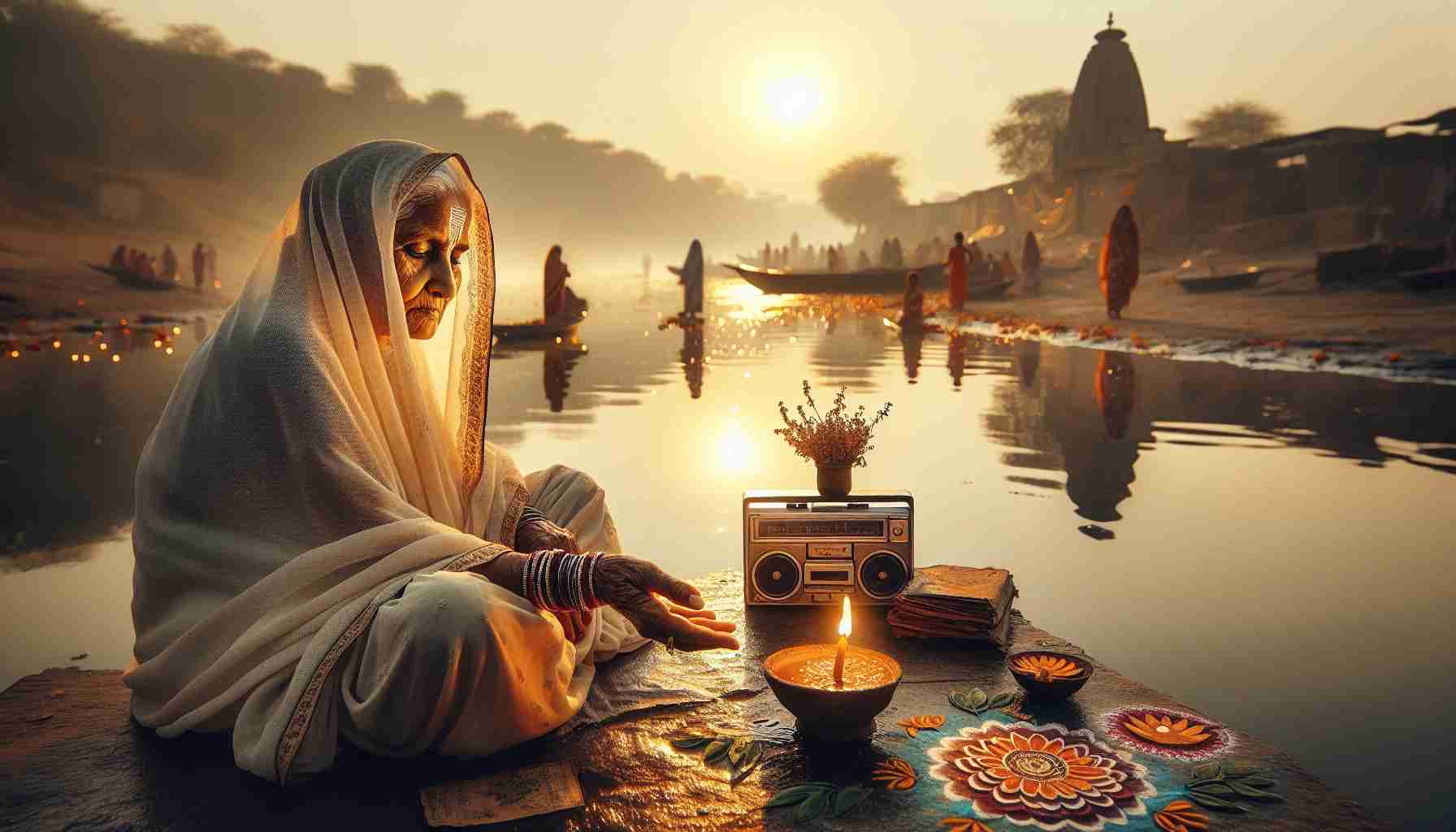

I am Radhika, a widow from a small village tucked between the mango orchards of Gujarat.
It’s been seven years since Harish, my husband, passed away. The morning he left, I still remember—I had just finished my tulsi puja, placing fresh water by the little plant as he asked me to every day. He smiled across the verandah and said, “You always keep hope alive.” That afternoon, his heart gave way.
After that, the days blurred.
The house turned silent. The walls that once echoed cricket commentary and teasing laughter now held only the sound of my breath. People offered condolences, then slowly stopped visiting. My son had already moved to the city with his family, and though he called once a week, I always said I was fine. I wasn’t.
I stopped singing bhajans. I stopped lighting the diya at the altar. What was the point when the Divine hadn’t listened?
One morning, I walked to the riverbank, the same spot where Harish used to gather pebbles and toss them into the Narmada, counting the ripples. I sat there in my plain white sari, staring at the water. A group of children from the temple ran past, laughing, their little voices singing: “Govind Bolo Hari Gopal Bolo…”
That chant—so familiar from our youth—clawed at something in me. I hadn’t heard it in years. Without thinking, I softly whispered along. Just once: “Govind Bolo…”
A breeze danced across the river.
I returned home feeling strangely lighter. I dug through the attic and found an old cassette player and a dusty tape labeled “Morning Bhajans.” Harish’s handwriting.
I played it.
As the voice of Anuradha Paudwal filled the room—singing of Krishna, the flute-playing deity who stands as a beacon of love and longing—I wept. Not in anger this time. Just… release.
I began lighting the diya again. Just a tiny flame, flickering. But it brought warmth.
One evening, while listening to the Gita—Bhagavad Gita Chapter 2, verse 13 surfaced: “Just as the boyhood, youth, and old age come to the embodied soul in this body, in the same manner, is the attaining of another body; the wise are not deluded at that.”
In that moment, it sank in. Harish wasn’t gone, not really. His atma—soul—had simply moved on.
Bhakti, devotion, doesn’t fix what's broken—it makes space for the broken to breathe again.
Soon, I started cooking prasad—offering food to Krishna before my simple meals. I resumed going to the small local mandir every ekadashi. I even volunteered to water the new tulsi sapling growing at its entrance.
Sometimes, the ache still comes. But now, it comes alongside peace.
Like the line from the Ramayana that my grandmother used to repeat: “Jeevan ka saar hai Bhakti”—the essence of life is devotion.
I had thought my soul was a pile of ashes.
But Bhakti… Bhakti whispered to those ashes until they stirred. Until they remembered how to feel the warmth of love again.
I am Radhika, a widow from a small village tucked between the mango orchards of Gujarat.
It’s been seven years since Harish, my husband, passed away. The morning he left, I still remember—I had just finished my tulsi puja, placing fresh water by the little plant as he asked me to every day. He smiled across the verandah and said, “You always keep hope alive.” That afternoon, his heart gave way.
After that, the days blurred.
The house turned silent. The walls that once echoed cricket commentary and teasing laughter now held only the sound of my breath. People offered condolences, then slowly stopped visiting. My son had already moved to the city with his family, and though he called once a week, I always said I was fine. I wasn’t.
I stopped singing bhajans. I stopped lighting the diya at the altar. What was the point when the Divine hadn’t listened?
One morning, I walked to the riverbank, the same spot where Harish used to gather pebbles and toss them into the Narmada, counting the ripples. I sat there in my plain white sari, staring at the water. A group of children from the temple ran past, laughing, their little voices singing: “Govind Bolo Hari Gopal Bolo…”
That chant—so familiar from our youth—clawed at something in me. I hadn’t heard it in years. Without thinking, I softly whispered along. Just once: “Govind Bolo…”
A breeze danced across the river.
I returned home feeling strangely lighter. I dug through the attic and found an old cassette player and a dusty tape labeled “Morning Bhajans.” Harish’s handwriting.
I played it.
As the voice of Anuradha Paudwal filled the room—singing of Krishna, the flute-playing deity who stands as a beacon of love and longing—I wept. Not in anger this time. Just… release.
I began lighting the diya again. Just a tiny flame, flickering. But it brought warmth.
One evening, while listening to the Gita—Bhagavad Gita Chapter 2, verse 13 surfaced: “Just as the boyhood, youth, and old age come to the embodied soul in this body, in the same manner, is the attaining of another body; the wise are not deluded at that.”
In that moment, it sank in. Harish wasn’t gone, not really. His atma—soul—had simply moved on.
Bhakti, devotion, doesn’t fix what's broken—it makes space for the broken to breathe again.
Soon, I started cooking prasad—offering food to Krishna before my simple meals. I resumed going to the small local mandir every ekadashi. I even volunteered to water the new tulsi sapling growing at its entrance.
Sometimes, the ache still comes. But now, it comes alongside peace.
Like the line from the Ramayana that my grandmother used to repeat: “Jeevan ka saar hai Bhakti”—the essence of life is devotion.
I had thought my soul was a pile of ashes.
But Bhakti… Bhakti whispered to those ashes until they stirred. Until they remembered how to feel the warmth of love again.